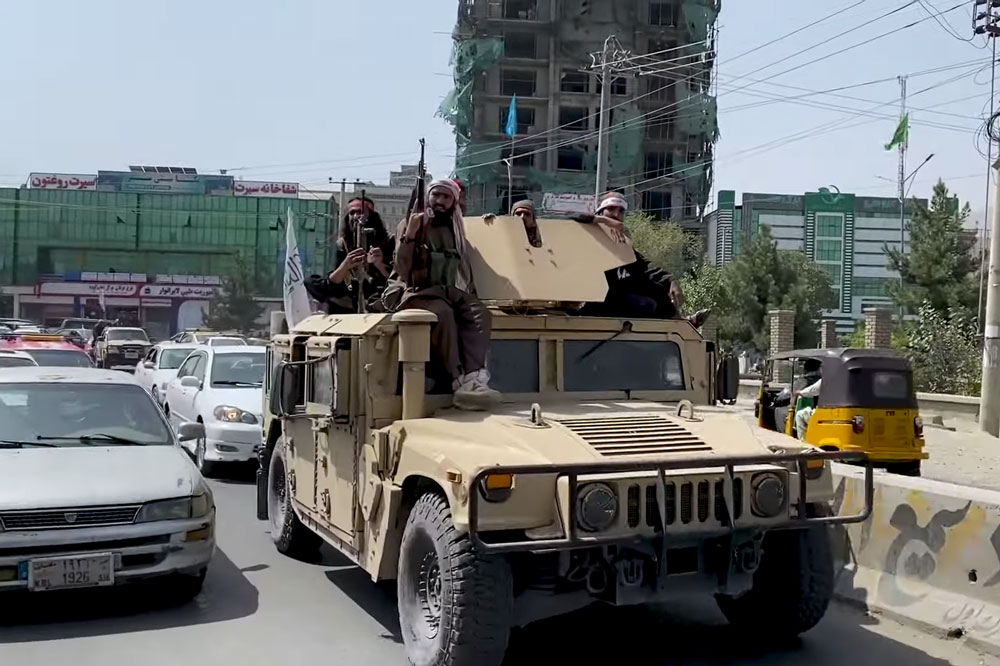By Safiullah Taye, Arif Saba, and Niamatullah Ibrahimi
Afghanistan’s democratic republic fell on August 15, 2021.
The Taliban retook power as the final American and NATO forces left the nation, leaving the Afghan people to prepare for an uncertain future.
Four years after making pledges of moderation and inclusion, the Taliban have erected an oppressive, exclusive government that has mercilessly destroyed the legal, judicial, and civil rights systems.
International interest has diminished as the Taliban regime has strengthened its hold. Afghanistan has lost prominence as crises in Gaza, Ukraine, and other places have taken center stage on the international agenda.
Can the international community now muster the courage to apply genuine pressure as the Taliban look to end its isolation and establish legitimacy?
The Taliban s emirate of repression
The Taliban disregarded the nation’s 2004 constitution after regaining power, which allowed the government to function without a clear rule of law. Rather, the Taliban’s reclusive commander, Mullah Hibatullah Akhundzada, controls by edict from his Kandahar base.
Human rights organizations now refer to the Taliban’s brutal persecution of women and girls as gender apartheid and contend that it ought to be considered a new international crime.
Women have been excluded from public life by decrees that forbid them from working, attending public places, or receiving an education beyond basic school (except from religious instruction). Without a male guardian, or amahram, women are likewise unable to roam freely in public.
The Ministry of Women’s Affairs was similarly dissolved by the Taliban, who replaced it with the Ministry for the Propagation of Virtue and Prevention of Vice. The ministry uses frequent raids, arrests, surveillance, and public space monitoring as a primary tool of repression to perpetuate institutionalized gender discrimination.
Hazaras, Shias, Sikhs, and Christians are among the minority ethnic and religious groups that have been excluded and persecuted as a result of Taliban rule.
Human rights organizations have reported the Taliban’s harsh crackdowns on the local population in the province of Panjshir, which is the center of resistance to the Taliban. These crackdowns have included extrajudicial murders, torture, and mass arrests and detentions.
In general, the country’s civil space has been severely damaged by the Taliban. Fear, violence, and arbitrary arrests have all been used to silence journalists and activists. Widespread self-censorship and an information blackout have resulted from this, allowing abuses to go unpunished.
Journalists, activists, and regular people continue to oppose the Taliban in spite of the enormous risks. While some women operate covert schools for girls and record atrocities in the hopes of future accountability, others have organized nonviolent rallies in the face of harsh crackdowns.
Humanitarian aid dwindling
Some regional powers have urged for the country’s international isolation to be lessened, despite the fact that the majority of nations do not recognize the Taliban as the official and legitimate government of the nation.
Russia was the first nation to officially recognize the Taliban last month. Additionally, China is strengthening its diplomatic and economic relations with the organization. The Taliban referred to New Delhi as a key regional partner following a recent meeting between India’s foreign minister and his Taliban equivalent.
Although foreign aid is still coming into Afghanistan, a study released this week by a US watchdog revealed that the Taliban are using force and other tactics to reroute it.
Following the Taliban’s return, the United States continued to provide more than 40% of all humanitarian aid to Afghanistan. However, this financing has virtually vanished as a result of US President Donald Trump’s decision to slash the US Agency for International Development.
Essential services have been severely damaged, and the nation is in danger of experiencing one of the biggest humanitarian disasters in history.Malnutrition is on the rise, and medical services have closed. The humanitarian crisis has been exacerbated by the mass expulsion of hundreds of thousands of Afghans from Iran and Pakistan.
In an effort to improve conditions in Qatar, the UN has been attempting for years to mediate negotiations between the Taliban and the international community. It has, nevertheless, encountered numerous obstacles.
Only until the UN agreed to exclude women and civil society organizations and to limit the agenda did the Taliban agree to join the negotiations in the middle of 2024. There were no concessions or breakthroughs from the conference.
The major conundrum is still how to engage the Taliban without endorsing its oppressive rule, even if another round of negotiations is expected.
Courts making some progress
The Taliban’s systematic violations of human rights have an impact on the entire world. Experts caution that a movement known as “Talibanization,” which is a comparable form of repression, is spreading to other nations.
For instance, Houthi officials in Yemen have enforced restrictions that resemble Taliban decrees in that they forbid women from going out in public without a male guardian and limit their employment.
International organizations have made progress against the Taliban, even though individual states have not been able to reach a consensus on a coordinated response.
Akhundzada and the Taliban chief justice were the targets of arrest warrants issued by the International Criminal Court in July, which charged them with crimes against humanity related to persecution based on gender.
Separately, four nations—Canada, Germany, the Netherlands, and Australia—have started the process of filing a lawsuit against the Taliban for gender discrimination at the International Court of Justice. This would be the court’s first time.
The establishment of an independent international investigative body by the UN member states to methodically record and look into crimes perpetrated by the Taliban is necessary to support these efforts. Such a mechanism would help preserve evidence and lay the groundwork for future prosecutions.
The suffering of the Afghan people will only get worse in the absence of coordinated international pressure, and the Taliban’s form of repression will continue to affect women’s rights well beyond Afghanistan’s boundaries.
![]()
Arif Saba is a visiting scholar in international relations at Deakin University; Safiullah Taye is a researcher and sessional academic at Australian Catholic University; and Niamatullah Ibrahimi is a Senior Research Fellow at the Initiative for Peacebuilding at the University of Melbourne.







